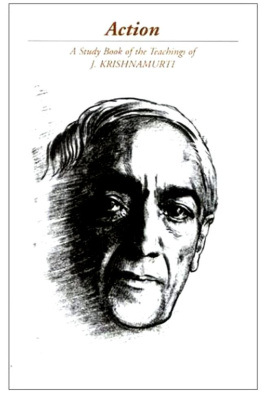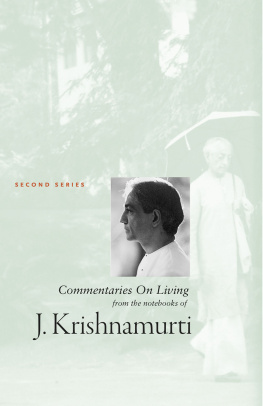Krishnamurti - Why Are You Being Educated?
Here you can read online Krishnamurti - Why Are You Being Educated? full text of the book (entire story) in english for free. Download pdf and epub, get meaning, cover and reviews about this ebook. publisher: Krishnamurti Foundation India, genre: Religion. Description of the work, (preface) as well as reviews are available. Best literature library LitArk.com created for fans of good reading and offers a wide selection of genres:
Romance novel
Science fiction
Adventure
Detective
Science
History
Home and family
Prose
Art
Politics
Computer
Non-fiction
Religion
Business
Children
Humor
Choose a favorite category and find really read worthwhile books. Enjoy immersion in the world of imagination, feel the emotions of the characters or learn something new for yourself, make an fascinating discovery.

- Book:Why Are You Being Educated?
- Author:
- Publisher:Krishnamurti Foundation India
- Genre:
- Rating:3 / 5
- Favourites:Add to favourites
- Your mark:
- 60
- 1
- 2
- 3
- 4
- 5
Why Are You Being Educated?: summary, description and annotation
We offer to read an annotation, description, summary or preface (depends on what the author of the book "Why Are You Being Educated?" wrote himself). If you haven't found the necessary information about the book — write in the comments, we will try to find it.
Why Are You Being Educated? — read online for free the complete book (whole text) full work
Below is the text of the book, divided by pages. System saving the place of the last page read, allows you to conveniently read the book "Why Are You Being Educated?" online for free, without having to search again every time where you left off. Put a bookmark, and you can go to the page where you finished reading at any time.
Font size:
Interval:
Bookmark:
Why Are You Being Educated?
Copyright 2002 Krishnamurti Foundation Trust Ltd
Why are you
being educated?
T ALKS AT I NDIAN U NIVERSITIES
J. Krishnamurti
K RISHNAMURTI F OUNDATION I NDIA
Is it not the very essence of ignorance when we depend on others for this inward look, this inward understanding, inward observation of the extraordinary processes that go on? To depend on the experts to tell us what to think about ourselves, and to look at ourselves through the philosophers eyes, or through the eyes of the guru, or those of any of the religious leaders throughout the worldis that not ignorance?
***
And if you are a student, what is your future? Just to pass some examination, get a job, and fall into the trap which the past generation has created, get married, have a little house with a wife and children? And to fight, struggle, be thoroughly discontented, miserable? Is that what is going to happen? That will inevitably happen, though you may be a technocrat with a good salary, a good position, and full of your own importance. You may have a degree, do extraordinary work, help to go to the moon or to live under the sea for a month. Incredible things have been done technologically. But as human beings what are we?
Contents
T ALK AT THE B ENARES H INDU U NIVERSITY 1969
F IRST T ALK AT THE U NIVERSITY OF B OMBAY 1969
S ECOND T ALK AT THE U NIVERSITY OF B OMBAY 1969
T ALK AT THE I NDIAN I NSTITUTE OF T ECHNOLOGY , M ADRAS , 1970
T ALK AT THE I NDIAN I NSTITUTE OF T ECHNOLOGY , M ADRAS , 1971
T ALK AT THE I NDIAN I NSTITUTE OF T ECHNOLOGY , B OMBAY , 1984
INTRODUCTION
This book consists of six talks that J. Krishnamurti gave at Indian universities and the Indian Institutes of Technology between 1969 and 1984.
Krishnamurtis association with universities goes back to the year 1922 when he visited the Berkeley University. The place made such a deep impact on him that he began to dream of creating in India a similar academic institution. In 1925 Mrs Annie Besant, president of the Theosophical Society, decided to build a World University in India, possibly close to Krishnamurtis birthplace, Madanapalle in Andhra Pradesh. That he shared her vision is evident from the Editorial Notes he wrote for The Herald of the Star in April 1925: What has absorbed most of my thoughts and time since I got to India is a scheme for the founding of a new International University at Madanapalle in South India. Such an idea has long been a dream of mine and that dream is now going to be realized.
Though Krishnamurtis dream did not take shape, his passion for education remained vital throughout his life, resulting in the founding of five schools in India and two abroad.
In the 1920s Krishnamurti addressed teachers and students at the Theosophical College in Adyar, Madras, and Vijayawada in Andhra Pradesh. In 1930 he gave a talk at the Boys College in Tiruchi, Tamil Nadu. Addressing students of the D. J. Sind College in Karachi on 15 February 1933, Krishnamurti begins on a characteristic note:
I have never passed a single examination. I have sat for three examinations, but you know when you go to the Examination Hall, how everything turns black. Probably you have not felt like that, but I did, so I tried three times, and three times I successfully failed!
However, he makes due amends for such an opening by seeking the forgiveness of the Principal, the Professors, and yourselves.
Krishnamurtis first significant address to students is to be found in the series of three talks he gave in 1954 at the Benares Hindu University. Towards the late 1960s and early 1970s when the campuses in the West were in revolt, he gave talks at the University of Puerto Rico, the Claremont Colleges California, and the New School for Social Research, New York. This was followed by talks at Brandeis, Berkeley, Stanford, and Santa Cruz. These talks can be found in the two volumes, You are the World and Talks with American Students.
During the same period, Krishnamurti addressed students in India too. In the six talks in this volume, his chief concern is to awaken studentsand the teachers tooto the fact that the pursuit of knowledge does not liberate man from his ignorance of himself. While knowledge, especially technological knowledge, is indispensable, it also creates the illusion that we have the intelligence to meet the challenges of life. This illusion makes us neglect the vast and subtle field of the human psyche, the field of human relationship. All this, Krishnamurti declares, is the essence of ignorance.
However, even while trying to shake the students out of their complacency, Krishnamurti also holds before them the possibility of a life in which there can be both meaning and beauty, responsibility as well as freedom. If I were a student, I think I would ask that: how to live a very simple life, without conflict, how to live completely, richly, and fully, without any contradiction, so that life does not become a battlefield. Then I would also ask: Is there something beyond all this? Is there something that man in the past has always sought?
For Krishnamurti, right education cannot be based on academic blueprints and programmes. On the contrary, learning for him is synonymous with learning about oneself; it is not the mere pursuit of knowledge but the exploration into the world within. This vision comes through clearly in these talks, which therefore have significance not just for the young but also for parents, teachers, and all those interested in the deeper issues of human existence.
K.K.
The crisis in the technological and human world
T ALK AT THE B ENARES H INDU U NIVERSITY 1969
So what is necessary is a total mutation, a total transformation, of the whole structure and nature of the brain and of the mind also, because the crisis is so vast, so complex...
Perhaps, after I talk a little, you would be good enough to ask questions, and thus we shall be able to communicate with each other more freely.
I think it must be fairly obvious to most people that violence is spreading throughout the world, every form of violence: rioting, wars, hatred of one group towards another. In America you see race riots and students revolts; in Europe it takes a different form. And in India you probably know what is going on much better than I do. So one of the great problems is why man lives in violence. Why does he perpetuate violence? The intellectuals have given many explanations: overpopulation, modern social life, people living cooped up in cities where they have no space at all, technological development that cultivates only a part of the human being, and so on. They have experimented putting rats in a very narrow space and found that the rats become disoriented and destroy each other because they have no space to live. There have also been other explanations: that society is undergoing a tremendous change because religions, education, science have completely failed, and they have not brought about peace between man and man. On the contrary, society is becoming more and more complex; more and more laws are being passed, and so there are those who say there must be a bigger, nobler, wider, and more authoritarian leadership. There is the communist world with its authority, with its dictatorship, and that too has not solved the problem. If there is any kind of free expression, people are put into an asylum or their card or whatever it is, is taken away; and the writer, the painter, the thinker is no person at all. So that is what is going on in the world.
How is this violence to be stopped? This country has for many years preached non-violence as an idea, but I am afraid the ideal hasnt been of any value at all because people are just as violent as anywhere else, as has been shown in the students revolt in this university; in the other cities also there have been riots. This seems to be the most prevalent expression of human relationship: if nothing works, let us burn the other person or destroy him through war, which is caused by divisions as races, nationalities, and so on.
Next pageFont size:
Interval:
Bookmark:
Similar books «Why Are You Being Educated?»
Look at similar books to Why Are You Being Educated?. We have selected literature similar in name and meaning in the hope of providing readers with more options to find new, interesting, not yet read works.
Discussion, reviews of the book Why Are You Being Educated? and just readers' own opinions. Leave your comments, write what you think about the work, its meaning or the main characters. Specify what exactly you liked and what you didn't like, and why you think so.









